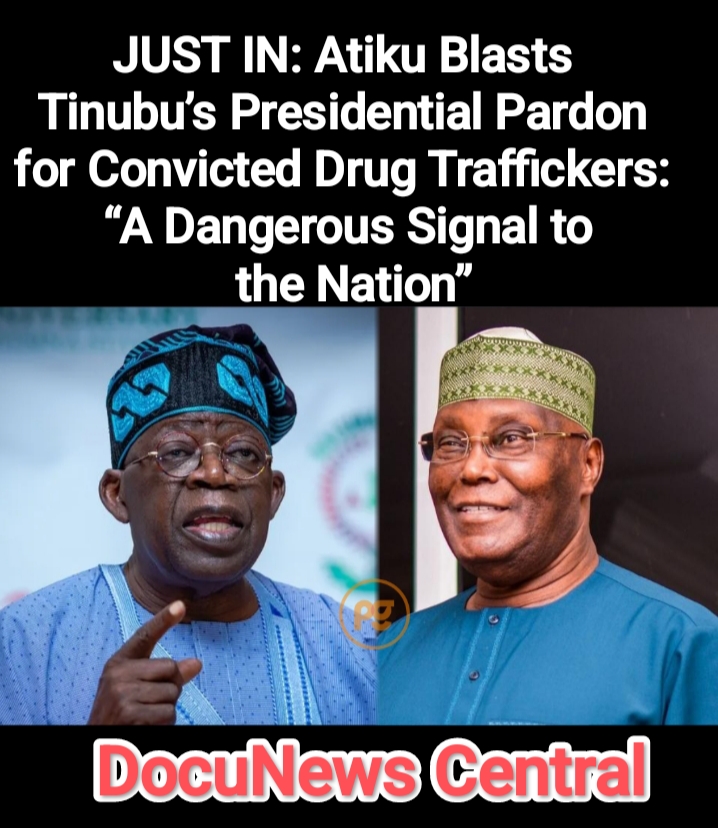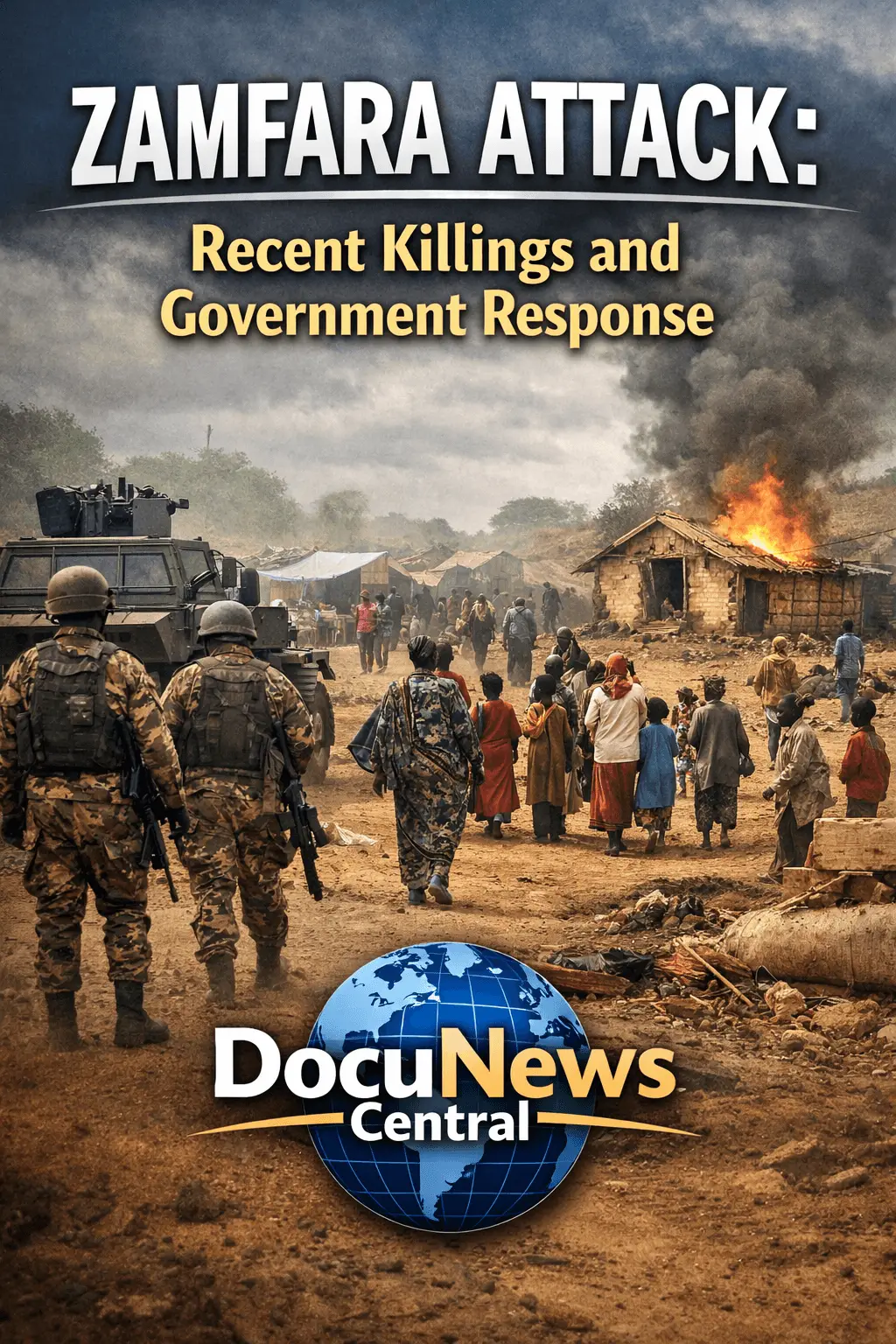
Atiku Blasts Tinubu’s Presidential Pardon for Convicted Drug Traffickers: “A Dangerous Signal to the Nation”
By DocuNews Central | October 2025
The political atmosphere in Nigeria is once again heated. President Bola Ahmed Tinubu’s recent decision to grant a presidential pardon to 175 convicts has sparked national debate and raised serious questions about justice and leadership.
Among those pardoned are individuals convicted of drug trafficking, kidnapping, murder, corruption, and other serious crimes. According to credible sources such as The Guardian Nigeria, Vanguard, and Punch Newspapers, the decision was announced through the Ministry of Justice and has since drawn strong condemnation.
What Happened: Tinubu’s Controversial Presidential Pardon
The decision came after the Presidential Advisory Committee on Prerogative of Mercy submitted its report recommending clemency for several inmates. Acting on Section 175 of Nigeria’s 1999 Constitution, President Tinubu approved the release or sentence reduction of 175 individuals.
However, controversy arose when it became clear that the list included drug traffickers and convicted murderers. Reports indicate that 29% of the pardoned convicts were drug offenders, sparking outrage across the country.
Atiku’s Reaction: “This Sends a Dangerous Signal”
Atiku Abubakar issued a statement on his verified social media platforms, condemning the decision. He said:
“Granting clemency to individuals convicted of drug trafficking and other serious crimes sends a dangerous signal to the public. It weakens the fight against criminality and erodes faith in the justice system.”
He added that while the government preaches discipline and order, its actions contradict its own message. His remarks have since gone viral, dominating political conversations nationwide.
The Legal Foundation: What the Constitution Allows
Section 175 of the 1999 Constitution empowers the President to grant pardons, commutations, and reprieves. It allows mercy for humanitarian reasons or as a recognition of reformation. Nonetheless, critics argue that legality alone does not make the act justifiable or morally sound.
They insist that the inclusion of convicts for violent and drug-related crimes sends the wrong message at a time when Nigeria struggles with insecurity and rising drug abuse. read also Over 7,000 Nigerians Still in Terrorists’ Captivity Across Seven States. for verified news like ours visit http://legit.com
Why Nigerians Are Outraged
1. Mixed Signals on Drug Policy
With the NDLEA intensifying its war on drug trafficking, releasing offenders undermines those efforts. Critics say it could embolden cartels and frustrate enforcement officers.
2. Public Trust in Justice Eroded
Many Nigerians already feel justice favors the powerful. Pardoning dangerous criminals reinforces the idea that political connections override accountability.
3. International Image at Stake
Nigeria’s partnerships with bodies like the UN Office on Drugs and Crime (UNODC) rely on consistency in anti-drug policy. Such pardons may weaken international cooperation and affect aid programs.
Reactions from Civil Society and Analysts
Civil society groups and legal experts reacted strongly. HURIWA called the move “a slap in the face of victims.” SERAP demanded that the presidency release the full list and criteria for mercy. Transparency International said the decision erodes deterrence and undermines anti-corruption reforms.
Legal analyst Professor Chidi Odinkalu commented that “mercy without transparency turns into injustice.” He urged future administrations to make the pardon process public and evidence-based.
Presidency’s Defense
The Presidency insists the pardons followed due process. Attorney-General Lateef Fagbemi (SAN) said the list went through the appropriate vetting stages. He argued that many beneficiaries showed remorse, learned vocational skills, and met the set rehabilitation criteria.
Despite the explanation, skepticism remains. Observers note that granting mercy to those convicted of severe crimes like trafficking and murder may weaken deterrence.
Can Tinubu Be Right and Wrong at Once?
From a legal perspective, the president acted within constitutional rights. From a moral standpoint, the optics are problematic. Nigeria’s justice system depends not only on law but also on public perception of fairness. When convicted traffickers go free, citizens lose confidence.
Similar controversies have arisen before. In 2022, then-President Buhari faced criticism for pardoning two ex-governors jailed for corruption. Tinubu’s case seems to follow a pattern where mercy blurs the line between compassion and politics.
International Repercussions
Global partners have supported Nigeria’s fight against narcotics. However, clemency for traffickers could complicate these relationships. Allies may view it as inconsistent with Nigeria’s commitments to international drug treaties.
Restoring Public Confidence: The Way Forward
- Publish the full list of pardoned individuals with reasons for each decision.
- Define clear, public eligibility guidelines for future pardons.
- Include independent civil society observers in the process.
- Prioritize humanitarian cases over politically sensitive ones.
Transparency can transform the prerogative of mercy from a source of suspicion into a symbol of justice.
Fact Check Summary
- Claim: Atiku criticized Tinubu’s pardon for drug traffickers and murderers, saying it “sends a dangerous signal.”
- Verdict: True. Verified by multiple reputable outlets including Vanguard, Punch, and The Guardian Nigeria.
- Legal Basis: Section 175 of the 1999 Constitution empowers presidential clemency.
- Controversy: The inclusion of violent offenders sparked national outrage.
Conclusion: Mercy or Misjudgment?
President Tinubu’s exercise of mercy has opened a new debate about justice and accountability. While clemency is constitutional, leadership requires moral discernment. Atiku’s criticism serves as a reminder that justice must be consistent, transparent, and fair.
For Nigeria, this is more than a political argument — it’s a test of values. Mercy should never become a loophole for impunity.
© 2025 DocuNews Central — All Rights Reserved.
Reproduction or redistribution without credit is prohibited.











That’s is the country we have what can anyone do.
Your point of view caught my eye and was very interesting. Thanks. I have a question for you.